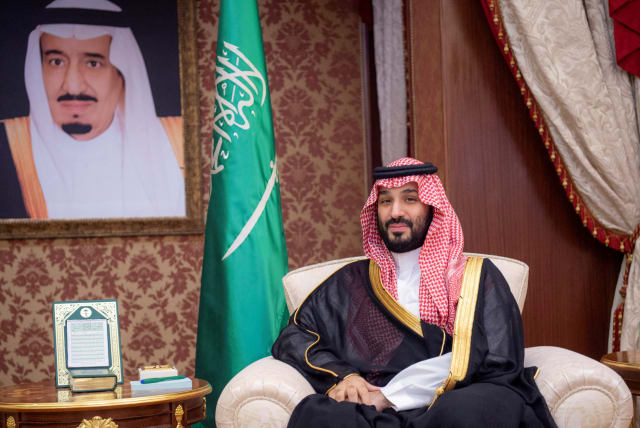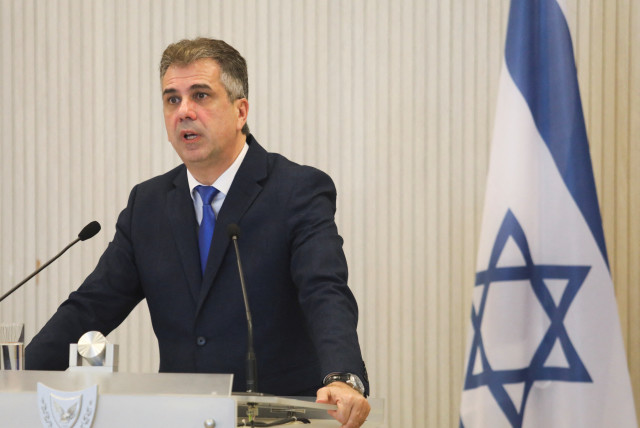Israel split on Saudi nuclear program as US advances normalization deal

The Wall Street Journal reported that the US and Saudi Arabia agreed on broad terms for normalization which would be expected within a year.
Israeli officials are divided on the question of whether a Saudi Arabian civilian nuclear program would be too risky, as the kingdom and the US make progress on talks towards an Israel-Saudi normalization agreement.
The National Security Council has been examining the potential impact on Israel’s security from the Saudis’ requests of the US in the framework of normalization talks, which include a civilian nuclear program and defense guarantees. Israel remains outside of the negotiations, and a senior diplomatic source on Tuesday said it was premature for Jerusalem to discuss specific terms to which it may or may not agree.
Yet the talk of Saudi Arabia requesting US help with a civilian nuclear program raised concerns in Israel that it could be a step towards developing a nuclear weapon should Iran do so.
Eli Cohen: US should give the Saudis a defense guarantee against nuclear Iran
Foreign Minister Eli Cohen wrote in the Wall Street Journal on Tuesday that the US should give Saudi Arabia a guarantee to defend it against Iranian nuclear aggression as part of a peace deal with Israel.
Cohen compared the nuclear threat Iran poses to other countries in the region with North Korea’s nuclear threat to South Korea and beyond.

“South Korea, despite living under the shadow of a nuclear-armed neighbor and having the means to develop its own nuclear weapons, has abstained from nuclear weapons development,” Cohen wrote. “The US defense commitment acts as South Korea’s deterrent against Northern aggression. A comparable American defense pledge could reassure Middle Eastern nations, primarily Saudi Arabia and the Gulf states.”
If Iran builds a nuclear weapon, “it would almost certainly ignite a regional nuclear arms race,” with Saudi Arabia, the Gulf states, Egypt, and Turkey considering doing the same and “potentially plunging the entire Middle East into conflict,” he wrote.
While neither Saudi Arabia nor Iran has an acute need for alternative energy, since both are major oil producers, Riyadh clearly looks at Tehran’s civilian uranium enrichment program, much of which was permitted in the 2015 nuclear agreement with world powers, and wants something similar, the senior diplomatic source said.
“Israel wouldn’t want proliferation anywhere, but the most important thing is to stop Iran from getting a nuclear weapon,” he said.
Nevertheless, normalization is “all plus-plus, no minuses,” the source said. “It’s in our national security interest to have relations with Saudi Arabia.”
National Security Adviser Tzachi Hanegbi told the Journal this week that he had “full confidence” that “whatever the United States will decide” related to Saudi civilian uranium enrichment will take Israel’s security needs into consideration.
The White House downplayed a report in the Journal that it and the Saudis have a working plan to bring about Israel-Saudi peace within the next year.
National security spokesperson John Kirby said that “there's still a lot of discussing to happen here. There's still a lot of conversations that have to occur before we get there.”
"There is no agreed-to set of negotiations, there's no agreed-to framework to codify normalization or any of the other security considerations that we and our friends have in the region," he continued.
In addition to the timeline, the Journal reported that the US asked Saudi Arabia to limit its increasingly close defense and economic relationship with China as part of the broader agreement. This includes assuring the US that the kingdom will not allow Beijing to build military bases in Saudi Arabia, and to price oil with US dollars.
At the same time, the report said US President Joe Biden had not yet decided what he would give the Saudis in exchange for a historic Middle East peace agreement.
As the US-Saudi defense agreement is meant to come in conjunction with normalization with Israel, it is unlikely to go further than the Israeli security establishment deems safe. In addition, an agreement that Israel would view as a security problem would likely have difficulty getting the necessary 67 votes in the US Senate to be approved.
The Biden administration would like the deal to be completed by the end of 2023 and to avoid a prolonged fight in Congress during an election year, diplomatic sources have said.
A further element of Saudi normalization talks is tangible steps toward Palestinian statehood, which Riyadh demands that Israel make toward the Palestinians.
Saudi Arabia seeks greater concessions than Israel made in conjunction with the 2020 Abraham Accords, when Jerusalem agreed to drop its plan to apply sovereignty to West Bank settlements and established diplomatic relations with the United Arab Emirates and Bahrain. A commitment to not annex settlements would not be enough for the Saudis, diplomatic sources have said.
Netanyahu said earlier this week that the Palestinian issue is "sort of a check box."
"You have to check it to say you’re doing it. Is that what’s being said in corridors? Is that what’s being said in discreet negotiations? The answer is a lot less than you think," he told Bloomberg.
The prime minister said that "the Palestinians should have all the powers to govern themselves and none of the powers to threaten Israel. This means that in whatever final peace settlement we have with the Palestinians, Israel has the overriding security power in the entire area — ours and theirs.”
Also on Wednesday, Kirby said US President Joe Biden would meet Prime Minister Benjamin Netanyahu "somewhere in the United States" later this year but sidestepped a question about whether the encounter would be at the White House.
Hanegbi said on July 18 that Biden had extended an invitation to Netanyahu to visit the White House, but US officials have not yet confirmed that.
Reuters contributed to this report.
